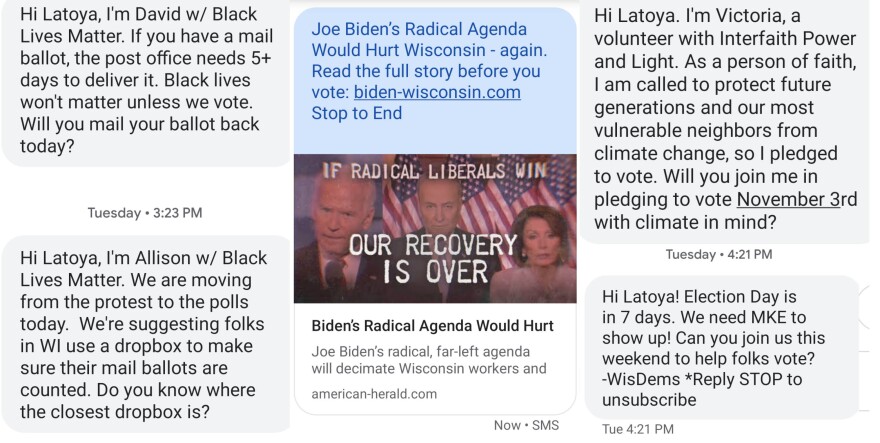With the presidential election just days away, your mailbox may be filling up with campaign flyers. You might also be getting lots of phone calls. And something that’s more common this year than in previous presidential elections: text messages.
Typically during election season, there’s a lot of door knocking by people canvassing neighborhoods, encouraging you to go to the polls or cast ballots for a certain candidate. But there’s less of that this time around.
“This pandemic changed everything," says Joe Zepecki, the communication director for For Our Future Wisconsin. It’s left-leaning and works to engage and inform voters on issues like wages, climate change, and police and prison reform.
Zepecki says that while door knocking and getting that face-to-face conversation is the gold standard of political campaigning, groups like his are having to rely on different means of connecting this time around. That includes text messages. Lots and lots of text messages.
Zepecki says for the groups trying to reach voters, it’s about a layered approach.
“We send a piece of mail to someone’s door and call them and text them. And what we know is the more layers you add into the communication the more impactful it is,” Zepecki says.

According to a poll recently released by the Elections Research Center at UW-Madison, likely supporters of Democrat Joe Biden are more likely to be contacted via email or text message than those who favor Republican President Donald Trump. Still, both sides are relying on the electronic outreach. Mark Graul is a GOP strategist based in Wisconsin.
“The nice thing about text messages is they’re relatively inexpensive and they’re incredibly targeted, right. You know who you’re sending them to, you know who’s gonna have an opportunity to see it. Now whether they see it and act on it is a different story. But they’re a very focused, concentrated way to hit a very specific audience with a specific message,” Graul says.
Well, most times at least. I have gotten a few text messages addressed to the wrong person.
“There’s no thing as a perfect list, right. And sometimes, especially when you’re using technology to deliver a message, there’s glitches in the system,” Graul says.
Graul says sometimes name lines and phone numbers get mixed up.
So, just how effective are these text messages? Not very, according to Kathy Cramer who teaches politics at UW-Madison.
“So, a text message from someone who’s important to you, who’s dear to you can be very effective. Especially day of the election if you haven’t voted yet. If you get a text message from a friend saying something like 'you know what, I’m headed to the polls, want to come with me?' That’s probably very effective. A text message from a stranger at this point it may be more annoying than mobilizing,” Cramer says.
Still, Cramer says there’s a lot to be learned from this pandemic presidential election and voter communication is toward the top of the list.





